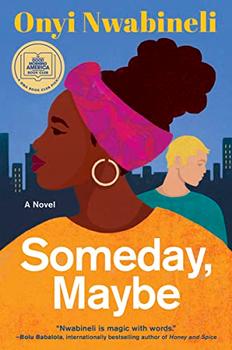Summary | Excerpt | Reading Guide | Reviews | Beyond the Book | Readalikes | Genres & Themes | Author Bio

A Novel
by Onyi Nwabineli
Husbands are not supposed to die in real life. Not when they are thirty-three years old and healthy; not when they leave behind a wife who is struggling to cope. The future is this huge, yawning black thing I can't see into. Before Q died, I could see our retirement house clearly—a Grand Designs concoction by the sea with rooms stuffed with books and photos. I could hear the waves. Now, when I try to set my mind forward, everything is blank. A mere fortnight ago, I was a woman with a husband who filled her world with shiny, pearlescent moments. I am now a woman with bloodstained jeans and hollow eyes, one who screams at her sister and frightens her mother and cries so hard it makes her choke. A woman being garroted by grief. A woman asking, How did I get here? How the hell did this happen to me? Is this something I even deserve?
3
You don't grow up the daughter of two high-achieving Nigerians without learning a few things about perseverance and the art of long-suffering. My parents packed up and shipped out from Benin and landed in London ready to live out their Igbo dreams and give us the best British life had to offer. This meant academy schooling. Gloria and I in the girls' chapter of St. Jude's and our brother, Nate, in the boys' down the road. You know the sort: pleated checked skirts, Latin lessons, stiff blazers and a coterie of rich white people who think they are better than you and laugh at your Jheri curl because you look like Lionel Richie as you trudge dejectedly through the polished halls. School life was a study in abject misery. I was one of ten Black kids at St. Jude's, a school of over eight hundred. Gloria was another. The others were in the years above me and we locked eyes as we passed one another in the halls, our expressions conveying our shared abhorrence at being shut up in such an establishment every day.
Our parents thought they were doing the right thing. Nigerian parents don't leave much room for failure. Your options as a Nigerian child are success or greater success. Mediocrity is to be cut out like a cancer, your pliable loin fruit molded into world-class surgeons and lawyers through discipline, a diet high in roughage and the best education a combination of government funding and extortionate school fees can buy.
I was already something of a shrinking violet, doing my best to remain anonymous and invisible, unlike Gloria, who commandeered the captainship of both the lacrosse and field hockey teams and braided her hair, meaning she did not leave smears of Afro Sheen on every surface she encountered. But St. Jude's made me fold into myself like an intricate piece of origami.
"It's like you want me to be miserable," I complained to Ma from the kitchen floor, where I had thrown myself after failing once again to convince her to pull me out of St. Jude's and allow me to attend the local comprehensive. Ma, who was waking up at 4:00 a.m. every day to hustle to a lab on the other side of London to analyze samples for her PhD thesis, eyed me in a way that made my blood freeze in my veins.
"First of all, am I your mate?" she asked. "Oya, pụa n'ebe à! I said get up! You don't lie on the floor in a uniform your dad and I paid for and tell me I want you to be miserable. What is making you miserable?"
The thing is you can't just tell African parents about your school troubles. Ma and Dad were breaking their backs to give us the best and to disparage St. Jude's would be to pour scorn on their efforts, to demonstrate your position as ungrateful offspring. They assumed St. Jude's to be free from the problems plaguing state schools. They were wrong—it only meant I got bullied by kids with tighter accents and double-barreled surnames. I also knew how these things worked. Parent-teacher meetings would be called and would do nothing but leave Dad grave and Ma shrill, readying herself to rain down the righteous fury of every indignant mother who has ever had to go to bat for her kids. So, I kept my mouth shut.
Excerpted from Someday, Maybe by Onyi Nwabineli. Copyright © 2022 by Onyi Nwabineli. Excerpted by permission of Graydon House. All rights reserved. No part of this excerpt may be reproduced or reprinted without permission in writing from the publisher.
Your guide toexceptional books
BookBrowse seeks out and recommends the best in contemporary fiction and nonfiction—books that not only engage and entertain but also deepen our understanding of ourselves and the world around us.